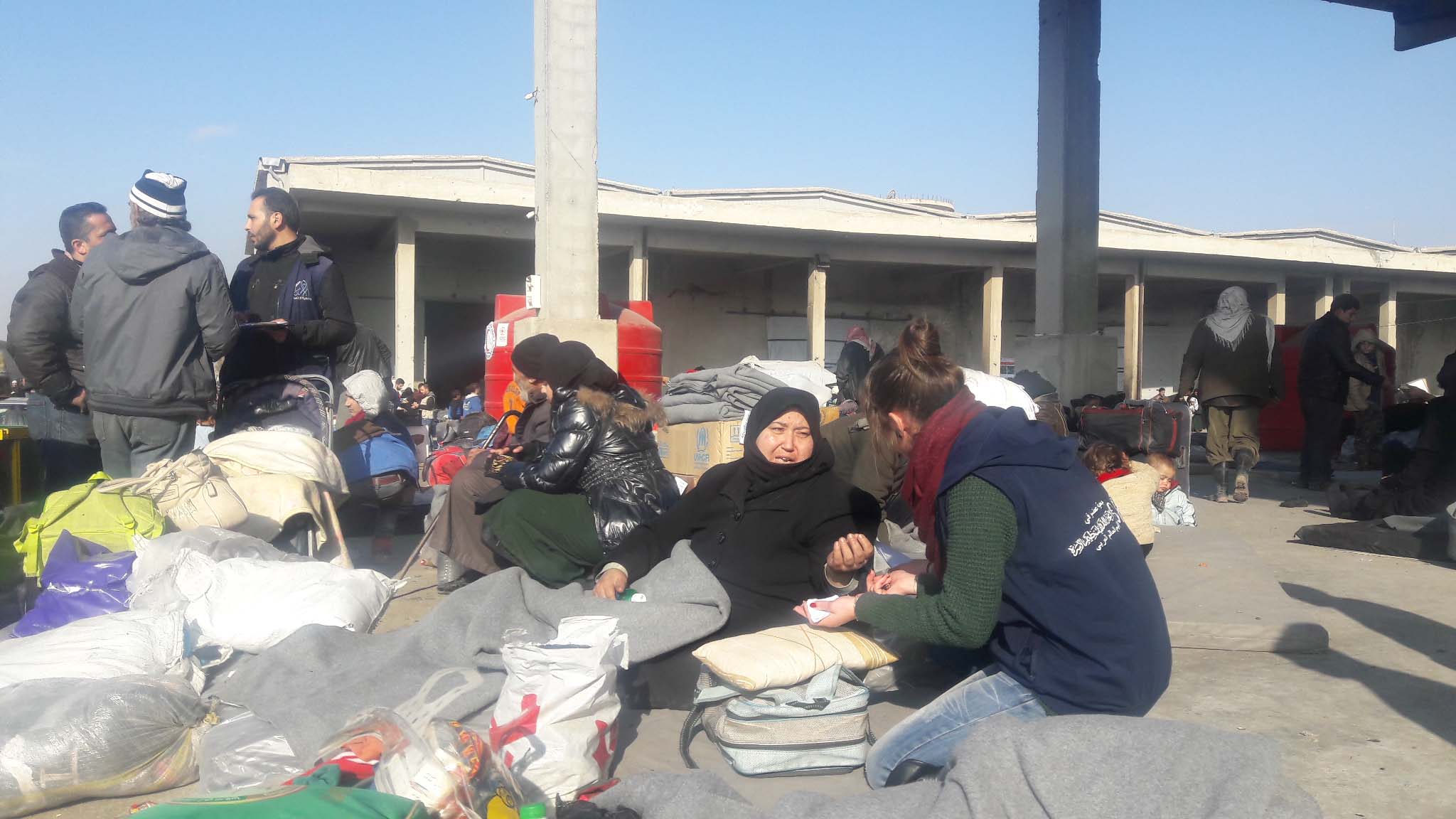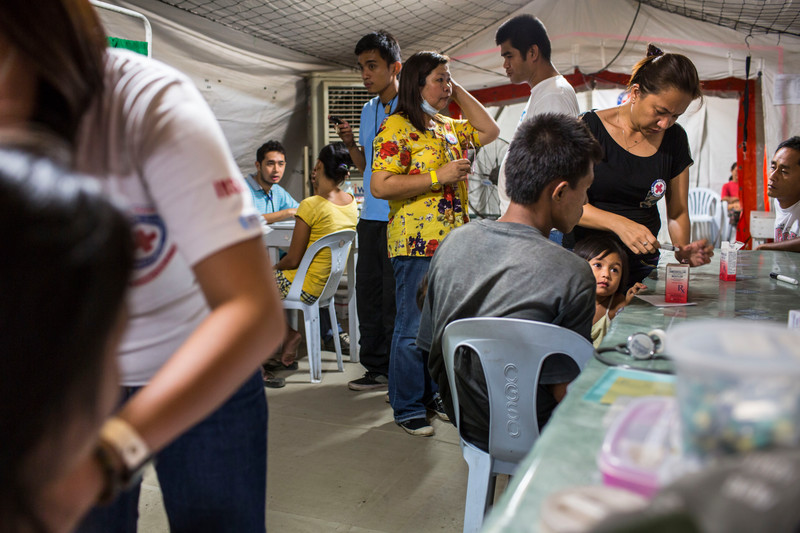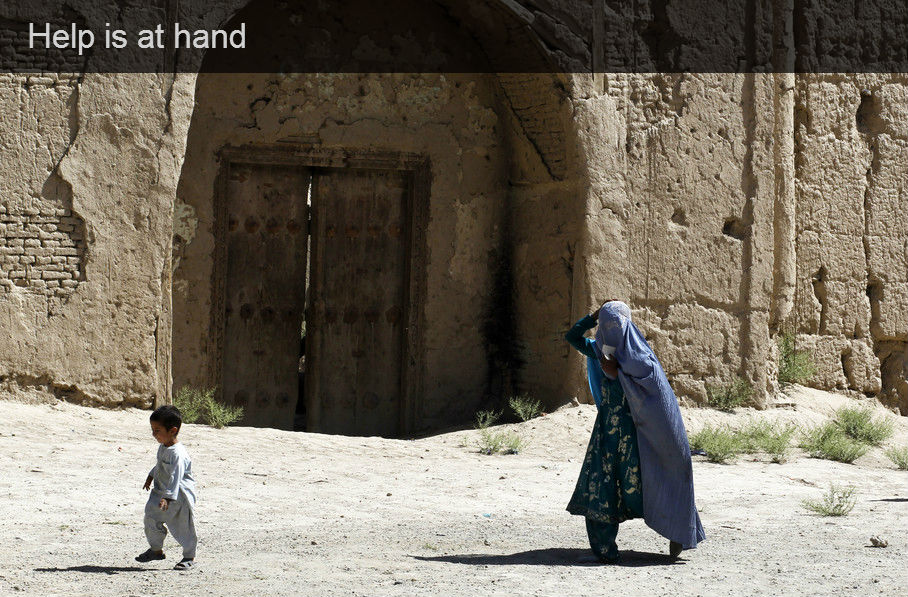
Spotlight
A selection of news from across the Federation

IPPF Statement on the 68th session of the Commission on the Status of Women (CSW)
IPPF welcomes the agreed conclusions of the 68th session of the Commission on the Status of Women (CSW), on the theme of “Accelerating the achievement of gender equality and the empowerment of all women and girls by addressing poverty and strengthening institutions and financing with a gender perspective”. IPPF actively engaged in the process by providing technical inputs to Member States, raising awareness about the interlinkages between SRHR, poverty, gender equality and the empowerment and human rights of all women and girls.
Filter our news by:


| 09 September 2017
Two earthquakes and four hurricanes: your help is needed NOW
Donate now to support our humanitarian response to Hurricanes Maria, Irma, Jose, and Katia and the earthquakes in Mexico. Four hurricanes and two earthquakes have hit America and the Carribean in the last weeks. The situation is unprecedented and the International Planned Parenthood Federation has activated its humanitarian response network. We’re assessing damage, working on deploying personnel, and making sure our clinics are ready to help in any way possible. Donate now to support our emergency relief efforts. Your gift will be used where it is needed the most. In the past 48 hours three hurricanes and an earthquake have hit the Western Hemisphere region. The situation is unprecedented and the International Planned Parenthood Federation has activated its Humanitarian Assistance Emergency Protocol. We’re assessing damage, working on deploying personnel, and making sure our clinics are ready to help in any way possible. Donate now to support our effort image credits: US Department of Defense

| 13 February 2017
Saving lives in Yemen
Amran is a small city about fifty kilometres north-west of Yemen’s capital, Sana’a. It is one of the poorest areas in the country, with extremely low health indicators. More than 58,000 internally displaced people are living in Amran, according to one report from the Task Force on Population Movements. This is the highest number of displaced people in the country. The Yemeni Association for Reproductive Health (YARH) is IPPF's accredited partner on the ground. Through them IPPF is prioritizing health access for women and girls, especially for those who are pregnant. YARH is also providing essential life-saving services to vulnerable groups. These people are at risk of sexual violence and fatal illness and diseases. YARH, with Yemen's Ministry of Public Health and Population, deployed a mobile medical team to Amran between September and November 2016. They treated approximately 600 internally displaced people, more than two-thirds of them women, who mostly received pre and postnatal care, counselling, contraception and essential medical treatment. The mobile team was made up of a female medical doctor and two midwives, two coordinators and a driver. They targeted displaced people in three remote districts: Khamir, Raydah and Kharif. With support from UNFPA and the Yemeni Women Union, we distributed a total of 1,000 dignity kits in Yemen. We also provided clean delivery kits to pregnant women in need. A low take up of family planning among these women is due to both a lack of awareness of and access to reproductive health services. In our raising awareness sessions we placed great importance on child spacing and how this can improve maternal and child health. We also reached just under 2000 people in displaced communities, with information on breastfeeding, nutrition and hygiene. In other initiatives on the ground, YARH is also working together with people living with HIV and up-skilling service providers on delivering contraceptive implants. Complementing these activities are empowerment projects youth leadership programmes to increase access to comprehensive sexuality education. Conditions are extremely tough – and dangerous – but we remain committed to serving the people of Yemen and doing all we can for their sexual and reproductive health.

| 16 December 2016
Plea for Aleppo
My Name is Dr Lama Mouakea. I am the Executive Director for the Syrian Family Planning Association. We are now in the fifth year since the start of unrest in Syria, the situation continues to worsen. With half million people being killed and more than ten million having fled their homes, the conflict has now escalated, violently affecting the people in Aleppo, Syria’s largest city. We still are in Aleppo. The situation is difficult. We are struggling to survive. People are coming here because they are not safe. Thousands have left East Aleppo in fear. It is cold. People walk long distances. There is so much crowding and for my staff the hours are very long. There are too many people. Everywhere is crowded and this limits where we can find spaces to provide our services. The security situation in the city means that we are trying to deliver services and see as many people as we can. We know that who we treat today we may not see again. We are providing the highest number of services from mobile clinics, to contraceptive supplies, to essential medicines including vitamins. We have medical teams and volunteers providing sexual and reproductive health services, psychosocial and paediatric through a range of mobile clinics and mobile teams so we can reach people. The risks for women and girls from sexual violence is high. We have seen many cases in our psychosocial support of violence that this kind of displacement exposes them to. We provide tailored support to the survivors of sexual violence, which has increased enormously during the war. There isn't enough services for the people. The demand is high and we need more assistance. With such high numbers and suffering, our internally displaced need urgent help. My staff are also suffering. We cannot keep up and want to survive. We won't leave because our place is here to help our people. I can only hope that the world can hear me. Please consider the Syrian people and what we are going through. We need money to give hope to people and help them survive and save lives. Support IPPF's work in Aleppo DR LAMA MOUAKEA | Executive Director, the Syrian Family Planning Association Mrs. Lama Mouakea has been the Executive Director of the Syrian Family Planning Association (SFPA) for the last 19 years and has a long history of working with sexual and reproductive health services. Currently she is responsible for supervision of 114 staff and coordination of 600 volunteers. Under her leadership the SFPA has played a major role in responding to the emergency situation in Syria, providing sexual and reproductive health services to people who are internally displaced due to the on-going conflict, with a focus on mother and child care and nutrition, psychosocial support, first aid and training of health personnel in the provision of clinical management for rape survivors and coverage of the minimum initial service package among a lot of other things.

| 20 October 2016
Urgent appeal: Typhoon Haima strikes the Philippines
Another dangerous tropical cyclone has emerged in the Pacific Ocean. The Typhoon Haima hit the northern part of the Philippines and considering the strength of the storm this cyclone will have had a high humanitarian impact. Please make a donation now. As of reporting time, a total of 18,157 families (90,589 individuals) were evacuated. Initial reports from the Cordillera Region show that 113 houses were damaged. With the strength and extent of the destruction, it is most likely that health and birthing facilities and schools were severely affected. In the rush to provide shelter and food in a crisis, the health and protection needs of pregnant women and young families are often overlooked. When the Typhoon struck approximately one in five women will have been pregnant. Without access to the right health care, we expect 20 per cent of them will incur complications during the delivery. Your donation will help us save lives. Having established partnerships in 170 countries, IPPF is one of the first responders when a crisis occurs. Helping the hardest-to-reach areas, particularly women and girls, we are often the only health providers there. The International Planned Parenthood Federation, working through the Family Planning Organization of the Philippines (FPOP), is responding to this crisis. We have worked together since 1969 and in recent years we have saved countless lives following Typhoon Haikui, Bopha, Trami and Haiyan. FPOP is working closely with the local government and international relief agencies to ensure that no women or her family is left behind and put at risk during this crisis. Nandy Senoc, FPOP’s Executive Director said “While we don’t yet know the full extent to the devastation, we are mobilizing our health workers and volunteers, to provide lifesaving services. As a volunteer organization, we are there before, during and after the crisis strikes. We are ready to respond now. For many women and girls in these affected areas, access to our essential health and protection services could mean the difference between life and death. I would like to thank you for supporting IPPF’s work and for standing by women and girls during difficult times like this. Your generosity today will help us support more women and girls as this crisis unfolds." With your support we reach over 2.2 million clients in crisis settings annually in all corners of the world.

| 02 August 2016
IPPF-SPRINT provides humanitarian assistance in conflict affected areas of North Cotabato, Philippines
Aug 2, 2016: New Delhi: Manila: The International Planned Parenthood Federation through its humanitarian wing, the SPRINT Initiative, is providing humanitarian assistance in the conflict-affected areas of Cotabato in the Philippines. The armed conflict between the Government of the Philippines (GPH) and the secessionist Moro Islamic Liberation Front (MILF) has lasted for more than five decades and has displaced around a million people in central Mindanao, Philippines. According to reports dated April 2016, the armed conflict has escalated, creating concerns over a protracted crisis and the vulnerability of women and girls. The conflict has internally displaced farmers who are living in the hinterland communities of the province of North Cotabato, namely in the municipalities of Makilala, Magpet, Kabacan and Tulunan. The SPRINT Initiative project will reach out to 25 affected villages or barangays located in geographically isolated and depressed areas, thereby making access to healthcare an extremely rare thing. As per the assessments done by IPPF’s East and South East Asia and Oceania Region office’s (ESEAOR) Member Association, the Family Planning Association of Philippines (FPOP), access to Sexual and Reproductive Health (SRH) services in these villages is very limited. “IPPF-SPRINT and FPOP will coordinate the implementation of this project with (the) UNFPA centre in Mindanao throughout the 4-month period from August to November, 2016. The Minimum Initial Service Package (MISP) will be implemented on-the-ground. IPPF-SPRINT will reach out to around 15,000 beneficiaries in the area and will provide crucial and life-saving SRH services. An amount of AUD 50,000 has been mobilised for the response,” said Aditi Ghosh, Director, IPPF-SPRINT. This humanitarian response is being funded by the Department of Foreign Affairs and Trade (DFAT) under the Australian government. “FPOP is a part of the UN cluster system, particularly Health and Protection clusters in the national level. FPOP will also coordinate the humanitarian response with UN regional centres covering affected areas. The North Cotabato Provincial Disaster Risk Reduction and Management Council (DRRMC) will also play a key role in implementing the MISP,” said Nora Murat, Regional Director, IPPF-ESEAOR. IPPF-SPRINT will work on prevention and management of the consequences of sexual violence, reduction of sexually transmitted infections (STIs) including HIV transmission, prevention of excess maternal and neonatal mortality and morbidity, plan for the provision of comprehensive SRH services and integrate into primary health care as the situation permits. Apart from the above, orientation on MISP and Risk Management for implementing partners and project staff/volunteers will be undertaken. Contact info: Murali Kunduru: [email protected] Jayamalar Samuel: [email protected] Media Contact: Rhea Chawla: [email protected] www.ippf-sprint.org The SPRINT Initiative is a Sexual and Reproductive Health (SRH) Programme in Crisis and Post-Crisis Situations. SPRINT ensures access to essential lifesaving SRH services for women, men and children in times of crises, a time when services are most needed yet are not prioritised or recognised by key humanitarian responders. The SPRINT Initiative saves lives and delivers on behalf of the Australian Government aid program (DFAT: Department of Foreign Affairs and Trade), which aims to provide more effective preparedness for and response to disasters and crises. The Initiative is managed by the International Planned Parenthood Federation (IPPF) and represents its commitment to increasing access to SRH services for crisis-affected populations. The International Planned Parenthood Federation is a global service provider and a leading advocate of sexual and reproductive health and rights for all. It is a worldwide movement of national organisations working with and for communities and individuals.

| 04 February 2016
A matter of life and death: IPPF's humanitarian response
Today, the Danish Family Planning Association (DFPA) together with the Danish All-Party Parliamentary Group (APPG) on Sexual and Reproductive Health and Rights, and the Danish Ministry of Foreign Affairs convened a conference with the International Planned Parenthood Federation (IPPF) on the challenges of sexual and reproductive health and rights (SRHR) in humanitarian crises. HRH the Crown Princess of Denmark and the United Nations Population Fund (UNFPA) were also in attendance. HKHK Mary: women are not vulnerable in hum crises because they are weak but because they lack equality #SRHRinCrises pic.twitter.com/EOhV38IpBi — Mette Gjerskov (@MetteGjerskov) February 4, 2016 More than 100 million people are in need of humanitarian assistance. It is estimated that 26 million are women and adolescent girls of reproductive age of which 500 die every day from complications related to pregnancy and childbirths. For example, the Syrian civil war has resulted in a 39% rise in maternal mortality since 2010 and gender-based violence is affecting at least 7 out of 10 women in some crisis settings. This shows a great need for humanitarian actors to ensure that the human rights of women and girls are protected and able to access sexual and reproductive healthcare. // IPPF: saving lives in crises Right now more than 250,000 women and girls need help. IPPF provides the emergency response needed, like family planning, which can reduce maternal deaths by 33%. SEXUAL & REPRODUCTIVE HEALTH SERVICES SAVES LIVES. AND IS A HUMAN RIGHT. Posted by IPPF on Thursday, 4 February 2016 The increasing number of humanitarian crises calls for serious rethinking of the current humanitarian response. The status of sexual and reproductive health and rights (SRHR) violations in humanitarian crises must be confronted and prevented. Over the past decade, IPPF has reached millions of people during floods, conflicts, earthquakes, cyclones when health care often collapsed, IPPF Member Associations continued to serve the unreachable particularly women which make three quarters of IPPF clients. We have an organizational strategy to address sexual and reproductive needs before, during and after humanitarian crises. IPPF starts with its Minimum Initial Service Package, which is life-saving, and transition to its Integrated Package of Essential services, which is life-changing. This ensure that a sxual and reproductive health situation is better after the crisis than before. @LcrTrc Crown Princess & @ippf CEO champion #women's #health & #rights in #humanitarian crisis settings pic.twitter.com/4ajLr0rkXg — Matthew Lindley (@t__box) February 4, 2016 Director general, Tewodros Melesse said, "Access to these services,especially in the midst of war or natural disaster, is a human right which does not only saves lives in the short run, but also helps build resilience amongst refugees and displaced people. It’s one of the most important aspects of humanitarian assistance that is often forgotten when disaster and conflicts strike."














